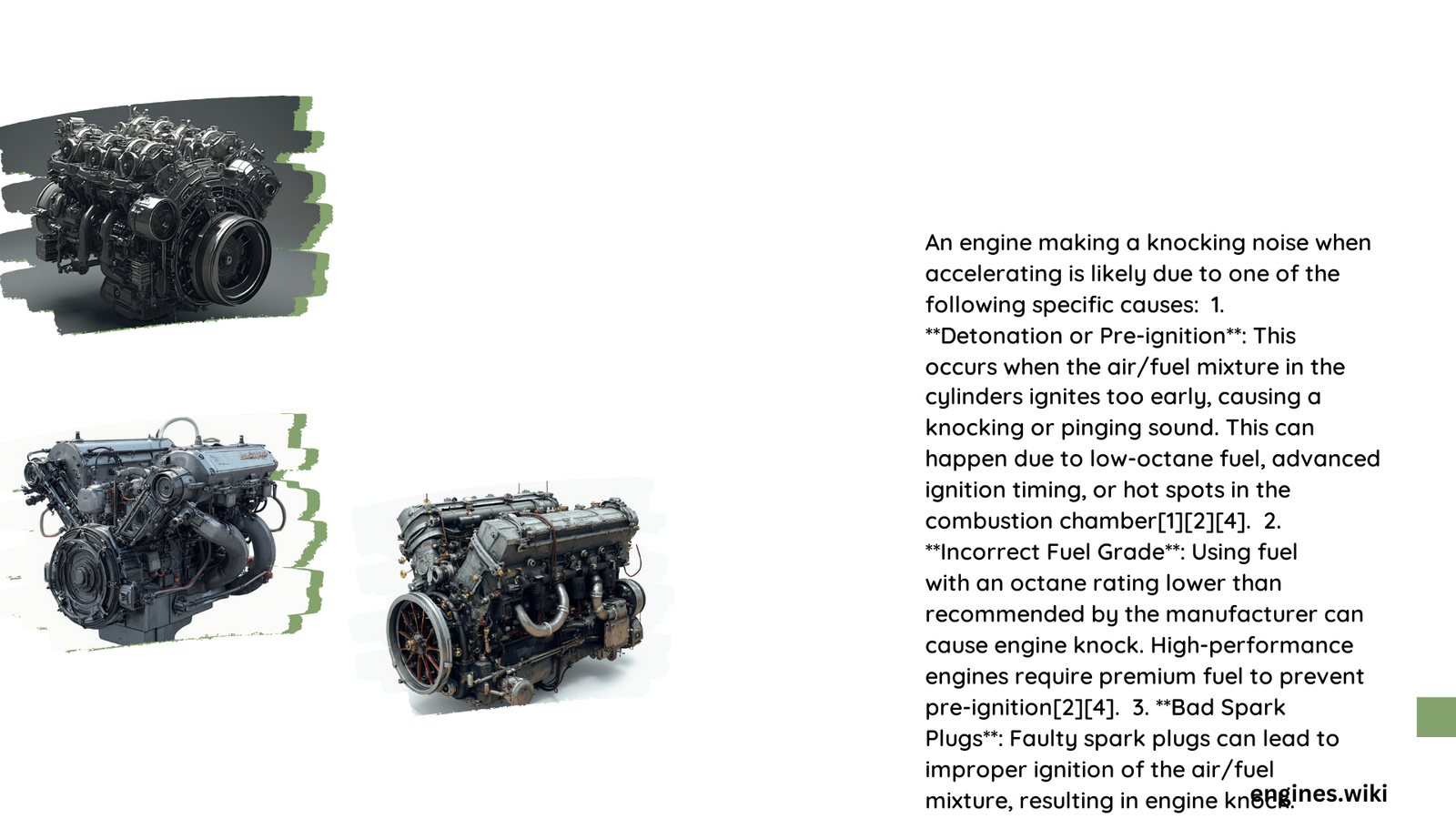Engine knocking during acceleration is a serious issue that can indicate various underlying problems. This alarming sound often occurs due to improper combustion, worn components, or fuel-related issues. Addressing the problem promptly is crucial to prevent extensive engine damage and costly repairs. This article explores the causes, diagnostic methods, and solutions for engine knocking noise when accelerating.
What Are the Common Causes of Engine Knocking During Acceleration?
Engine knocking during acceleration can stem from several factors:
- Incorrect Combustion Timing: When the engine’s timing is off, pistons may move at the wrong time, causing knock.
- Low-Quality or Incorrect Fuel: Using lower octane fuel than recommended can lead to pre-ignition and knocking.
- Worn Engine Components: Deteriorated bearings, pistons, or other internal parts can create knocking sounds.
- Carbon Buildup: Excessive carbon deposits can cause hot spots, leading to premature ignition.
- Faulty Knock Sensors: These sensors help adjust timing to prevent knock, and if malfunctioning, can allow knocking to persist.
- Lean Air/Fuel Mixture: Problems with fuel system components can create an imbalanced mixture, causing knock.
How Can You Diagnose the Source of Engine Knocking?

To pinpoint the cause of engine knocking during acceleration, follow these steps:
- Listen Carefully: Note when and how the knocking occurs. Is it constant or only during acceleration?
- Check the Basics: Ensure you’re using the correct fuel octane as specified in your owner’s manual.
- Use Diagnostic Tools: An OBD-II scanner can reveal error codes related to knocking or combustion issues.
- Inspect Spark Plugs: Remove and examine spark plugs for signs of wear or improper combustion.
- Test Fuel System: Use a fuel pressure gauge to check for proper fuel delivery.
- Examine Knock Sensors: Test the knock sensors to ensure they’re functioning correctly.
- Check Engine Timing: Use a timing light to verify correct ignition timing.
- Perform a Compression Test: This can reveal issues with carbon buildup or worn pistons.
What Are the Potential Consequences of Ignoring Engine Knock?
Ignoring engine knock can lead to severe consequences:
- Catastrophic Engine Failure: Persistent knocking can cause significant internal damage.
- Reduced Fuel Efficiency: Improper combustion leads to increased fuel consumption.
- Decreased Performance: Engine power and responsiveness may diminish.
- Increased Emissions: Knocking can result in higher levels of harmful exhaust emissions.
- Costly Repairs: What starts as a minor issue can escalate into major, expensive repairs if left unchecked.
How Can You Fix Engine Knocking During Acceleration?
Addressing engine knock depends on the underlying cause. Here are some potential solutions:
- Use Correct Fuel: Switch to the recommended octane rating for your vehicle.
- Replace Spark Plugs: Install new spark plugs if the current ones are worn or fouled.
- Clean Fuel System: Use fuel system cleaners or have a professional service performed.
- Replace Knock Sensors: If faulty, new knock sensors can help prevent knocking.
- Adjust Engine Timing: Have a mechanic correct the ignition timing if it’s off.
- Address Carbon Buildup: Professional cleaning or fuel additives can help remove deposits.
- Repair or Replace Worn Components: In severe cases, internal engine parts may need replacement.
What Preventive Measures Can You Take to Avoid Engine Knocking?
To minimize the risk of engine knocking:
- Use Quality Fuel: Stick to reputable gas stations and use the recommended octane.
- Regular Maintenance: Follow your vehicle’s maintenance schedule for tune-ups and inspections.
- Change Oil Regularly: Fresh oil helps prevent carbon buildup and ensures proper lubrication.
- Address Issues Promptly: Don’t ignore warning signs or check engine lights.
- Avoid Overloading: Don’t exceed your vehicle’s weight capacity, which can strain the engine.
When Should You Seek Professional Help for Engine Knocking?
Seek professional assistance if:
- The knocking persists after basic troubleshooting.
- You’re uncomfortable performing diagnostics or repairs yourself.
- The check engine light is on in conjunction with the knocking sound.
- There’s a sudden loss of power or change in engine performance.
- You notice other unusual sounds or symptoms along with the knocking.
Remember, early intervention can prevent minor issues from becoming major problems. If you’re experiencing engine knocking during acceleration, don’t hesitate to consult a qualified mechanic for a thorough diagnosis and appropriate repairs.
